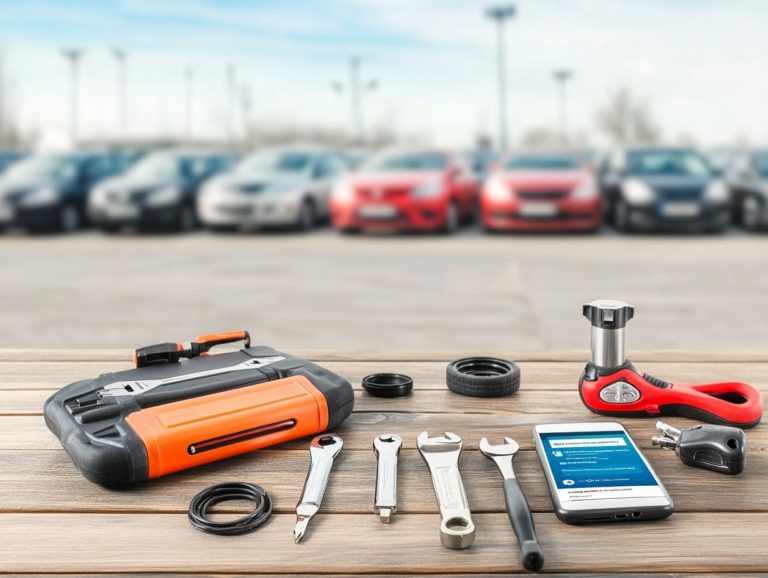Understanding Used Car Pricing: A Complete Guide
Navigating the used car market can feel overwhelming, especially when figuring out a fair price. Numerous factors influence the pricing of used cars, including age, mileage, overall condition, and market demand.
This guide covers the key elements that affect used car prices, giving you the knowledge to research and assess fair values. You’ll also find valuable tips for negotiating effectively with sellers.
It also looks at the pros and cons of purchasing from a dealer versus a private seller, ensuring you are well prepared for your next acquisition.
Contents
Key Takeaways:

Know what affects used car prices: age, mileage, and condition.
Research and compare market values to determine a fair price for a used car. Don’t forget to consider additional costs such as taxes and fees.
Negotiate with sellers to potentially lower the price, and use tips and strategies for successful negotiations.
Factors that Affect Used Car Pricing
Understanding the factors that influence used car pricing involves several key elements: age, mileage, vehicle condition, and market demand. Each of these aspects is crucial in determining a vehicle’s overall value.
As a potential buyer or seller, rely on trusted resources like Kelley Blue Book, NADA Guides, and Consumer Reports to navigate this landscape. These tools help you grasp the market nuances, ensuring you maximize your investment.
Age and Mileage
Age and mileage are two of the most critical factors shaping used car pricing. They directly influence depreciation and overall market value.
As you explore your options, you’ll notice that vehicles lose value rapidly in the early years, often shedding around 20% of their worth the moment they leave the dealership.
For example, a brand-new sedan with a sticker price of $30,000 might be valued at approximately $24,000 within just one year.
Remember, different makes and models lose value at different rates. Luxury vehicles typically experience a sharper decline in value compared to their more economically priced counterparts.
Research shows that premium brands like BMW and Mercedes-Benz can lose as much as 50% of their value in the first three years. In contrast, Honda and Toyota vehicles often maintain their worth better, making them particularly appealing to buyers mindful of long-term costs.
Vehicle Condition

The condition of a vehicle is vital in determining its market value. Key factors such as mileage, overall condition, and the availability of a comprehensive vehicle history report significantly influence your decisions as a buyer.
Beyond these elements, problems with how the car works and the aesthetics of both the interior and exterior are crucial in swaying your purchasing choices. A well-maintained car not only captivates with its visual appeal but also indicates it’s less likely to have hidden issues.
Maintenance records detailing regular service can enhance your confidence in the vehicle’s reliability. Therefore, conducting thorough inspections and obtaining reports from trusted sources like Carfax or AutoCheck can provide invaluable insights, allowing you to make informed decisions and shape your pricing strategy.
Market Demand
Market demand has a big effect on used car pricing, as your preferences often shift due to current trends, economic factors, and the availability of specific makes and models.
For example, during a recession, you might lean toward more affordable vehicles or postpone your purchase altogether, leading to a dip in demand for luxury brands. On the other hand, in a flourishing economy, your interest in higher-end vehicles could rise, pushing prices upward.
Seasonal trends also play a crucial role; for instance, convertibles become popular during warmer months, while SUVs are favored in winter.
Competition from dealerships, which often offer certified pre-owned options with warranties, can influence your decisions and steer you away from private sellers who typically lack such assurances. This dynamic shapes the market landscape.
How to Determine a Fair Price for a Used Car
Determining a fair price for a used car requires a step-by-step process. You ll need to look into market values and consider additional ownership costs.
This process gives you the insights needed to negotiate effectively. You can make an informed decision that matches your budget.
Researching Market Values

Researching market values is essential to ensure you re paying a fair price. Use resources like Kelley Blue Book, NADA Guides, and Edmunds for guidance.
Gather details about the vehicle its make, model, and year. This information helps you find its market worth on these platforms.
Cross-reference these estimates with local listings. Conditions, mileage, and location can all impact a vehicle s value.
User reviews and vehicle history also provide deeper insights. They help you make a well-informed decision.
Considering Additional Costs
When buying a used car, consider more than just the purchase price. Account for additional costs like taxes, insurance, and repairs.
These expenses can add up quickly. You should also think about maintenance costs like oil changes, which vary by vehicle type.
Be aware of registration fees and financing costs if you’re not paying in cash. Create a comprehensive budget that includes all these expenses.
Consulting a mechanic before finalizing your purchase can help you assess potential repair costs.
Understanding these factors helps you avoid unexpected financial burdens. Enjoy owning a used car without the stress of hidden costs!
Negotiating for a Better Price
Negotiating for a better price on a used car can feel challenging. With the right strategies, you can secure a deal that reflects the vehicle’s true value.
Tips for Negotiating with Sellers

Using effective strategies during negotiations can significantly improve your chances of landing a better price. Start by researching the vehicle s history.
Knowing about previous accidents or major repairs puts you in a strong position. Knowledge is your best ally here.
Set a firm maximum price to guide the negotiation. Stick to your budget for long-term satisfaction.
Maintaining a respectful demeanor creates a positive atmosphere. A polite approach can lead to better outcomes and discounts.
Additional Factors to Consider
Consider factors like vehicle history, maintenance records, and location. Seasonal trends can also affect availability and pricing.
These elements are crucial for making an informed decision and securing the best value for your investment.
Vehicle History and Maintenance Records
Vehicle history and maintenance records are essential factors that can significantly impact the perceived value of a used car. They offer a window into its past performance and care.
By obtaining detailed reports about a car’s history from trusted sources like Carfax or AutoCheck, you can uncover crucial information such as previous accidents, title status, and the number of miles the car has traveled. These details are instrumental in accurately assessing a vehicle’s worth.
Reviewing maintenance records shows how well the previous owner cared for the car. This level of transparency helps you make informed decisions and influences your pricing strategy.
Armed with this knowledge, you can negotiate with confidence while fostering trust in the competitive automotive market.
Location and Seasonal Trends
Location and seasonal trends are critical factors influencing the pricing and demand for used cars. Different markets exhibit unique availability and buyer preferences.
For instance, if you’re in a coastal area, you might notice a heightened demand for convertibles and SUVs, perfect for embracing that outdoor lifestyle. Meanwhile, in urban settings, compact cars often reign supreme due to the constraints of limited parking space.
During tax return season, many consumers leverage their refunds to upgrade their vehicles. This can lead to a surge in demand and potential price hikes for popular models. As summer rolls around, prices for family cars may increase in anticipation of road trips, underscoring how geographic location and seasonal shifts shape market dynamics.
Buying from a Dealer vs. Private Seller
When deciding between purchasing a used car from a dealership or a private seller, consider the advantages and disadvantages of each option.
Each avenue presents its own benefits and potential pitfalls that warrant your attention.
Pros and Cons of Each Option
When weighing the pros and cons of buying a used car from a dealer versus a private seller, consider factors like price, warranty options, and the ease of financing.
Dealers often bring a reassuring level of reliability. They typically offer warranties that protect you against unexpected repairs, along with certified pre-owned options that come with added assurances. This commitment to quality can be particularly appealing if you re not well-versed in vehicle maintenance.
On the flip side, private sellers can provide significant cost savings. Their prices are generally more negotiable and often lower than those at dealerships, giving you the chance to snag a better deal. However, this flexibility may come with less certainty regarding the vehicle’s condition and history.
Ultimately, taking the time to weigh these considerations can help you make a decision that aligns perfectly with your needs and budget.
Research both avenues today to find the best deal on your next car!






